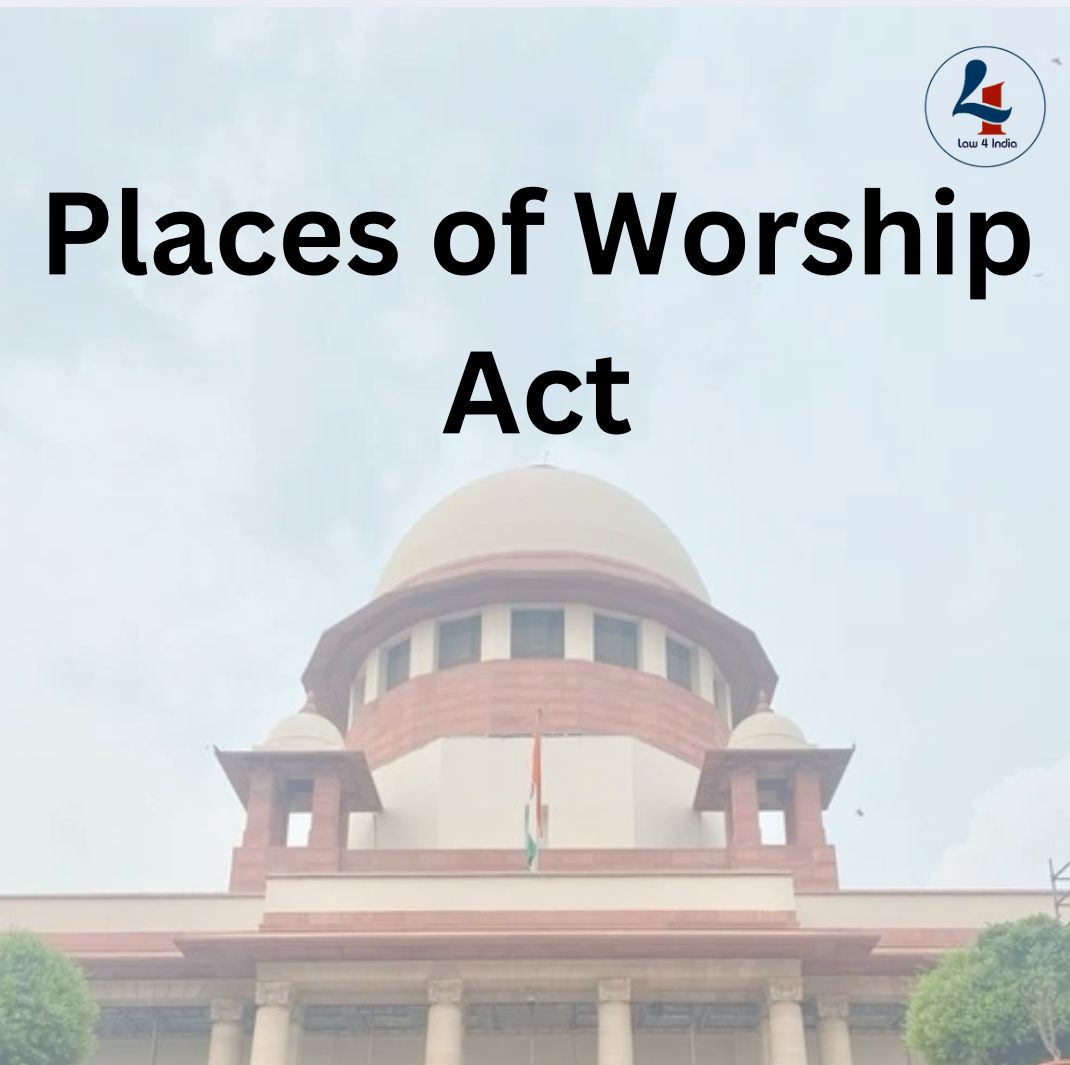- By Ayush
The Indian Supreme Court will start reviewing the Places of Worship (Special Provisions) Act of 1991 in April 2024 because of postponed hearings. Its high importance stems from merging assessments of Indian historical and religious dimensions with national social harmonization. Court rulings in this case will activate changes which touch all parts of both legal institutions and political systems while modifying social-cultural structures. Chief Justice Sanjiv Khanna and Justice Sanjay Kumar will administer the first April court hearing of the Places of Worship (Special Provisions) Act of 1991.
For the first time in 2020 a court challenge appeared against the Places of Worship Act passed in 1991 within the case Ashwini Kumar Upadhyay v. Union of India. Prime Minister P.V. Narasimha Rao passed the Places of Worship Act of 1991 to maintain religious sanctuaries at their original religious state preceding Indian independence on August 15, 1947. All religious site condition changes can only be reassessed by courts at Ayodhya based on the Places of Worship Act 1991, while every other religious site change remains beyond judicial authority under this Act. Following 2019 multiple court disputes regarding religious places of worship arose while the Supreme Court accepted complete authority to solve the Ayodhya conflict.
In March 2021 the Supreme Court requested the Union Government to share its perspective concerning the legal challenge to the constitutionality of the Act. Since its first submission multiple petitions against the statute have accumulated in different submissions. The Indian religious organization Jamiat Ulema-i-Hind appealed to the Court to request strict enforcement of the Act in 2022. The petitioners showed support for this legislation because they recognized that it offered protection of religious harmony and peaceful relations among religious groups.
The current procedures create confusion because multiple stakeholders continue to participate in the processes. The Gyanvapi Mosque Managing Committee and the Mathura Shahi Idgah Masjid Committee along with Dr. Jitendra Satish Awhad the Maharashtra MLA comprise the participants in this matter. The court witnessed Samajwadi Party MP Iqra Choudhary and CPI (M) leader and Rajya Sabha MP Manoj Jha present at the case regarding the enforcement of the Act. Because religious entities and numerous social and political organizations became active it demonstrated that religious restrictions had spread beyond legal boundaries.
Houses of Worship Act Section 4 (1991) creates the main issue since it requires religious institutions to preserve their religious nature by examining them on August 15, 1947. Places exempted under section 4 subject themselves to protection through the Ancient Monuments and Archaeological Sites and Remains Act of 1958. The petitioners contend Section 4 implements an unequal barrier that prevents both Sikhs and Jains and additionally Buddhists and Hindus from regaining possession of historic mosques that once served religious purposes. The religious institutions hold unfavorable legal ground since present-day laws fail to deliver adequate access to justice regarding past events.
Persons who endorse the Act justifiably state their support for its unifying impact on religious groups and communal residential patterns in India. Section 4 of the Act prevents judges from engaging in religious site disputes because supporters hope this will resolve past religious disputes as well as produce new legal matters. The authors declare that this law aims to protect current society from outdated grievances so India can advance with minimal historical constraints.
A December 12, 2023, temporary restraining order of the Supreme Court stopped both fresh legal grievances as well as new inspections of the locations where religious worship takes place. All houses of worship are now protected under the Supreme Court’s standing order that bars them from new inspections as well as new legal complaints. Subordinate courts were issued a Supreme Court order that prohibited them from dealing with legal issues concerning Sambhal Jama Masjid and Mathura Shahi Idgah and Gyanvapi Mosque in Varanasi. In the course of their inquiry the Supreme Court issued an interim order to maintain vital constitutional questions. The Supreme Court grants deadline periods to the government but has not been issued any official document that illustrates the government stance towards the Act.
Without any affidavit that is mandated the government allowed its first response periods to operate from July 11, 2023, to October 31, 2023. Legal experts and religious leaders in addition to political pundits are unclear on the position of the government since it has issued no statement on this touchy issue. To be conducted in April the Supreme Court will call for the administration’s formal position on the issue.
The Places of Worship Act, 1991 surpasses standard legal steps as it established India as a nation committed to religious equality and interfaith spiritual concord. The legislation specifically is for the express purpose of demarcating historic information from modern-day means for non-violent conflict resolution in India. Judicial Independence in religious laws and historical criminal justice and religious intercommunity relations are subjected to constant debates due to the court cases of religious heritage reviews in India. Future steps by the Supreme Court either to modify or repeal the Act may instigate numerous legal controversies regarding religious sites. When the Court makes the Act law it will create a clear platform to preserve social harmony among religious communities. The Supreme Court’s schedule for announcing its ruling is April 2024, which generates high public expectation across the nation. Thus, while India’s cultural infrastructure growth will definitely entail legal growth — it has to
trnscend the minimum threshold of statutory law requirements. The Supreme Court’s upcoming decision on religious disputes in India will strengthen public backing for mainstream democratic secularism and good governance principles.
The decision to be taken will have a deep influence on Indian society because it will set new legal benchmarks and affect social and political interactions over the course of the next two years. April 2024 will be etched in history as a turning point that will determine India’s constitutional values, religious harmony, and attempts at fostering national cohesion.

